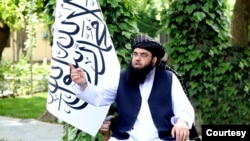Afghanistan's Taliban confirmed Wednesday they had appointed a caretaker prime minister to oversee daily affairs, saying the incumbent, Mohammad Hasan Akhund, is unwell and needed time to recover.
The new head of the all-male Taliban cabinet, Abdul Kabir, is under terrorism-related United Nations sanctions, along with several other senior members of his hardline government. He was elevated from serving as the deputy prime minister for political affairs.
Taliban spokesman Zabihullah Mujahid announced the power shift on Twitter. He said that Akhund, 78, had been in the southern city of Kandahar for some time undergoing treatment and resting, and he will return to Kabul soon to resume his duties.
"It's a routine matter in the governance process for a caretaker to take charge to ensure the smooth running of the administrative affairs," wrote Mujahid. "No one needs to worry about it, nor should they use it for propaganda."
Mujahid was responding to reported claims that Akhund had resigned due to alleged internal Taliban rifts and would not return to the office.
The Taliban reclaimed power in August 2021, when the United States and NATO troops departed Afghanistan after two decades of involvement in the war. The Taliban subsequently established an interim government and appointed Akhund as its prime minister.
The hardline group has banned teenage girls from receiving education beyond the sixth grade and women working for the United Nations and non-governmental organizations in Afghanistan. Most female government employees have not been allowed to return to work since the Taliban took control of Kabul.
The Taliban reject international calls for reversing the restrictions on women, saying it is an "internal social matter" of Afghanistan.
Torek Farhadi, a former Afghan official, said that instead of indulging in political reshuffling, the Taliban needed to pay attention to easing restrictions on women to address domestic and foreign concerns.
"The international community is looking more to change policies from Taliban than musical chairs among them in top positions of power," Farhadi told VOA. "What is expected is to let teenage girls go back to school and let women work in government offices and NGOs,” the analyst said.
Kabir was placed on the U.N. sanctions list in early 2001, when he served as the acting prime minister in the then-Taliban government shortly before it collapsed in the wake of the U.S.-led military invasion of Afghanistan.
The newly appointed Taliban prime minister was appointed as the military commander for eastern Afghanistan in 2007, when the then-insurgent group was waging attacks against U.S.-led foreign forces and their local Afghan allies.
Kabir was blamed for plotting some of the deadliest bombings and other insurgent attacks. He was allegedly collecting money from drug traffickers on behalf of the Taliban, the U.N. list showed. He was a member of the Qatar-based Taliban political office during negotiations with the United States, culminating in a deal in February 2020 and paving the ground for Washington to pull out of its longest war in history.
Reclusive Taliban supreme leader Hibatullah Akhundzada and current Interior Minister Sirajuddin Haqqani are among other top leaders under U.N. and U.S. terrorism-related sanctions.
The Taliban takeover led to an abrupt loss of most international aid for Afghanistan, which remains one of the worst humanitarian emergencies in the world. The U.N. says two-thirds of the country's estimated 40 million population is food insecure
Aid workers say the Taliban's restrictions on women have worsened the humanitarian situation.




